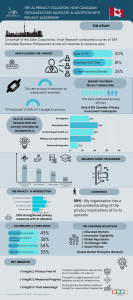Privacy is a key component of a successful AI strategy.
That’s according to new research from Zoho, the multinational technology and business software company. It shows that even as Canadian organizations embrace the promise of AI, they’re also carefully balancing business opportunities with privacy realities. Surveyed companies recognize that privacy and AI capabilities strengthen each other when properly integrated.
As the adoption of artificial intelligence accelerates across the global business landscape, most Canadian organizations are least actively exploring – if not implementing – artificial intelligence (AI); the report says that just 16% of surveyed companies have yet to adopt it.
Interestingly, the report notes that the push to adopt AI does not necessarily come from the top: only 26% of CEOs/presidents/owners are leading AI adoption; most of the initiative (52 per cent of adoption) comes from the staffers on their teams.
Whether actively working with AI systems as part of the company’s current operation or watching with much interest, companies identified three main obstacles to successful AI implementation: privacy and security concerns (37.2%), lack of technical expertise (36.6%), and cost concerns (32.3%).
Of course, each factor can influence the other, and the report underscores how companies clearly recognize that privacy is a core business function not a compliance afterthought.
AI privacy and security are not problems to be solved once, respondents conveyed. It is an ongoing capability to be developed and refined. As AI technologies continue to evolve and privacy expectations continue to rise, organizations must build adaptive capabilities that can navigate this changing landscape successfully. The survey data suggests that this capability is achievable for organizations willing to invest in the people, processes, and governance structures necessary for integrated AI-privacy excellence.
So, organizations may well understand the importance of privacy and security as key to successful AI implementation but they lack the technical capabilities to implement privacy-preserving AI solutions effectively.
This gap creates opportunities for developing integrated AI-privacy expertise, Zoho’s report says, and of course, using the business tools and tactics that best support that growth and development.
“As Canadian organizations integrate AI into their operations, it’s encouraging to see them embrace privacy as an enabler,” said Chandrashekar LSP, Zoho Canada’s Managing Director, when the report was released. “The proprietary data that businesses feed into large language models may not remain proprietary, and AI agents and chatbots can expose sensitive company data. So, including strong privacy foundations with AI implementation is essential. Without a privacy-first design, the value of proprietary data can quickly be overshadowed by the risk of losing it.”

Chandrashekar LSP, Zoho Canada’s Managing Director, speaks to an assembled crowd of Zoholics; Canadian users of the business software suite gather at an annual conference here to get the latest updates and user tips. The company just released three new localized business software solutions designed specifically for Canadian SMBs and solopreneurs. Supplied image.
His point is well-taken; privacy and security can be challenged when trying to process proprietary company data with open, public-accessible AI tools. One risk the report identified: 21.7% of organizations using public language models like ChatGPT and Claude for business activities (both systems may use the prompts and other inputs to generate its responses; user data can be collected and used to improve its abilities, although opt-out options are available).
And yet, AI adoption often leads to enhanced privacy protections, an observation which may run counter to many common assumptions about a conflict between AI implementation and privacy weakness. The report notes that a significant number of companies (just over 41 per cent) strengthened privacy measures post-AI implementation, an expression of confidence that AI privacy implications are, well, acted upon if not completely understood.
The report noted that compliance with AI privacy and security regulations was still an issue, with nearly 15 per cent of companies saying that regulatory compliance was a top concern. That’s one way privacy is seen as a business strategy: companies are moving beyond mere compliance to encompass broader business risk management and competitive differentiation.
The report also underscores the corporate understanding that addressing privacy issues is not a one-time activity, but an on-going strategy. That requires commitment and resources.
The survey indicates that just over 70 per cent of Canadian organizations rate their privacy investments as “adequate to excellent” – admittedly a broad range of activity – with nearly half saying as much as one third of their IT budget was dedicated to privacy. As well, more than eighty per cent of surveyed organizations say they have dedicated privacy officers or specific teams responsible for data protection.
And they do regular privacy updates: Zoho’s survey says about half of the companies conduct quarterly privacy impact assessments or annual reviews. Before implementing any new data-handling system, they (19.3 per cent or respondents) conduct specific privacy implication assessments.
Further clarity on AI regulation and legislation will have to wait, at least in Canada. The proposed privacy and protection legislation here, Bill C-27 and the all-important Artificial Intelligence and Data Act (AIDA) are being reviewed, revised and updated by the new government.
What’s more, the Annual Report of the Office of the Privacy Commissioner of Canada, called Prioritizing privacy in a data-driven world, also addresses the privacy implications of technology, with an emphasis on AI, which is one of the Commissioner’s strategic priorities through to 2027, when the Commissioner’s current mandate ends.
The OPC, by the way, has also opened investigations(along with some provincial privacy authorities) into the conduct of major AI companies, such as ChatGPT (being investigated for collecting and disclosing personal information gathered without consent); social media platforms like X (investigated “with respect to its collection, use and disclosure of Canadians personal information to train AI models”).
And in a recent court decision from Alberta, in connection with a case against facial recognition company Clearview AI, it was ruled that foreign organizations like Clearview are not exempt from provincial regulations, and that those AI companies operating in “data-intensive sectors” here should take a close look at their use of “public” data in AI and security contexts.
Such legal developments, and the industry insights gathered in reports like that commissioned by Zoho, clearly show how technology is transforming how we work – and how we can do that safely.
One of the keys is identifying competitive and productive ways to protect and promote fundamental rights to information privacy while getting the most out of new technological opportunities.
For its part, Zoho maintains it is committed to designing and incorporating artificial intelligence guided by the principles of customer privacy and value.
Zoho says its own generic AI models across contextual, assistive, and agentic AI are not trained on consumer data and do not retain customer information. The company operates its own data centres to maintain its oversight of customer data, privacy, and security.

Zoho reports continued growth across Canada with more than a 50 percent increase in customers, and a doubling of its Canadian employees, in the last year, Chandrashekar LSP announced at Zoholic Canada. The company has just launched Canadian versions of its popular business software tools, Zoho Payroll, Zoho POS, and Zoho Solo. Supplied image.
Zoho Solo, one of the company’s many business software tools, has been fully optimized for Canadian operations by supporting the Canadian dollar, being compliant with local tax regulations. The software tool, developed to support solo entrepreneurs, is hosted out of Zoho’s Canada data centre, operating in compliance with local data security and privacy laws.
As the Zoho report concludes, “[t]he emergence of privacy-first AI implementation as an organizational capability will likely become a defining characteristic of business leaders in the coming decade.
“Organizations that invest now in developing these integrated capabilities will be best positioned to leverage AI transformation while maintaining the trust and confidence of customers, employees, and regulators.”
# # #

The AI Privacy Equation: A survey of Canadian businesses shows how artificial intelligence and privacy protection can work together to a company’s advantage. Zoho / Arion Research graphic.
-30-



